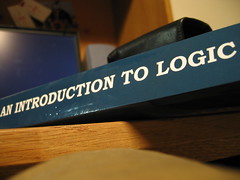 I proposed a conversation for the EduBloggerCon last Saturday, part of ISTE 2011. The title was something like “How Might Social Media/Networks Help to Redefine the Textbook?” From the digital votes that it got prior to the event, I’d assumed that the conversation would not make the cut, and so I did not finish up the Google Forms activity I had planned for kicking off the conversation. So I was surprised not only that it was scheduled as one of the first conversations, but also scheduled to be repeated during the afternoon. Someone made a mistake!
I proposed a conversation for the EduBloggerCon last Saturday, part of ISTE 2011. The title was something like “How Might Social Media/Networks Help to Redefine the Textbook?” From the digital votes that it got prior to the event, I’d assumed that the conversation would not make the cut, and so I did not finish up the Google Forms activity I had planned for kicking off the conversation. So I was surprised not only that it was scheduled as one of the first conversations, but also scheduled to be repeated during the afternoon. Someone made a mistake!
Anyway, I was able to hobble together the Google Forms activity, thanks to the immense patience of my un-audience, which resulted in this blog post of a few days ago.
The state of the textbook is such a huge and timely topic that I was not able to focus the conversation specifically on the implications of a next textbook’s socialness. But one issue that did emerge in both conversations what what we call future textbooks, that aren’t books? It’s always seemed like a trivial issue to me, because the English language is full of terms that no longer apply directly to their original meaning. For instance, the word manufacture use to mean to make by hand.
One likable idea came out of the afternoon session from a teacher who uses Moodle as the basis for her classroom instruction. She calls it her digital curriculum. I like it because it describes what we’re talking about in a way that leaves nothing out — though the otherwise useful term, digital, is somewhat limiting.
What I like most about this concept of a teacher designed, produced, and maintained assembly of resources and tools is that there is little that’s new about it. I have never asked the question before, but suspect that if I were to ask an audience, “How many of you do not use textbooks in their classes?” a significant number of hands would go up — and even more if I were to ask about their textbook being merely a supplement to the teachers collected curriculum.
There are two problems here, however, one of which I didn’t get a chance to ask during the unconference, and the second occuring to me on a few minutes ago.
Number one, what about the first year teacher? For how many of us was our textbook the life raft that saved us from drowning in the unexpected complexities of our first couple of years of teaching? This was certainly true for me. ..and somehow, using somebody else’s digital curriculum might not hold quite as much air as an industry structured hardcover-bound curriculum (textbook).
I often suggest to higher ed folks that their job is to prepare future teachers for the first five years of their career, and to make sure that they have the contemporary literacy skills to continue to self-develop within their profession. A significant and pivotal part of this might be the construction of their first year digital curriculum, something that they can carry with them into their job interviews.
But this solution, in itself, causes the second problem. You see, never again, could a principal meet you, a seven-year social studies teacher, in the mail room, two days before the students arrive for their first day of school, and say, “Mr. Warlick, I’ve got you teaching 8th grade math this year.” 🙁
You see,
a teacher,
carrying a self-made digital curriculum,
is a powerful thing!
